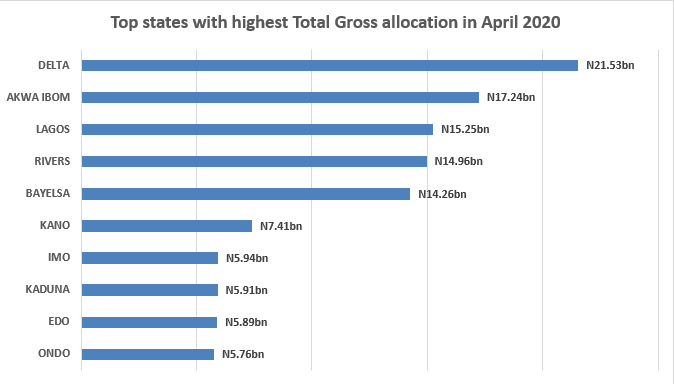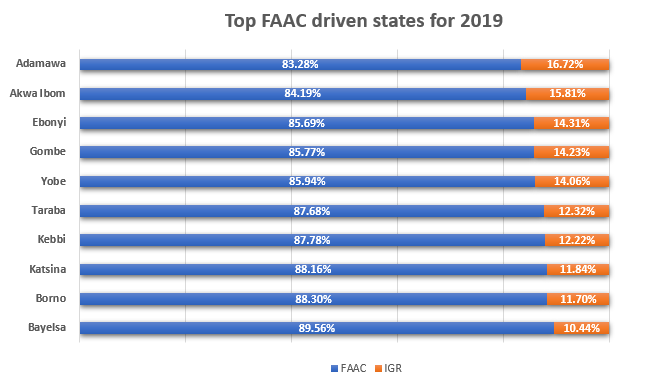The Federation Account Allocation Committee (FAAC) disbursed the sum of N780.93bn to the three tiers of government in April 2020 from the revenue generated in March 2020. This is according to the latest FAAC disbursement report released by the National Bureau of Statistics (NBS).
According to the report, the disbursement increased by 34.28% and 20.63% compared to N581.57 billion and N647.35 billion that were allocated in March and February 2020 respectively.
A breakdown of the report, shows that the Federal Government received a total of N264.33 billion, States received a total of N181.49 billion, Local Governments received N135.95 billion while the sum of N54.29 billion was shared among oil-producing states as 13% oil derivatives.
READ ALSO: Despite COVID-19, Lagos State Government says Q1 budget performance rose to N163.2 billion
Revenue generating agencies such as the Nigeria Customs Service (NCS), Federal Inland Revenue Service (FIRS), and Department of Petroleum Resources (DPR) received N6.09 billion, N10.2 billion, and N5.74 billion respectively as cost of revenue collections.
Meanwhile, the amount disbursed comprised of N478.18 billion from the Statutory Account, N119.5 billion from excess oil revenue, N120.27 billion from valued added tax (VAT), and N62.98 billion from exchange gain differences.

READ MORE: Finance Bill designed for the good of Nigerians – Finance Minister, Zainab Ahmed
States Allocation
Delta states scooped the highest share of the total states’ allocation from the FAAC, receiving a sum of N21.53 billion, accounting for 9.13% of States total gross allocation. Akwa Ibom followed closely, having received N17.24 billion (7.31%) as total gross allocation in April 2020 while Lagos state came third with N15.25 billion allocation.
Other top recipient states include; Rivers (N14.96 billion), Bayelsa (N14.26 billion), Kano (N7.41 billion), and Imo state (N5.94 billion).
On the other hand, five states with the share of total gross allocations for the month of April 2020 include – Kwara, Ekiti, and Nassarawa with N4.04 billion, N4.04 billion and N4.11 billion respectively. Others include Ebonyi (N4.14 billion) and Gombe state (N4.19 billion).
States deductions: For the period under review, a total sum of N36.38 billion was deducted from the states’ allocation for the following reasons:
- External debt deduction was put at N4.64 billion, while contractual Obligation (ISPO) was estimated at N6.44 billion. Other deductions represented the highest deduction as it cost the states a sum of N25.29 billion.
- According to the NBS, other deductions covered National Water Rehabilitation Projects, National Agricultural Technology Support Programme, Salary Bailout, Payment for Fertilizer, State water supply project, state Agricultural project, and National Fadama Project.
READ MORE: CBN releases new capital base, sanctions for Microfinance Banks in new draft guidelines
Revenue decline: Due to the slump in global oil price, escalated by the continuous ravaging effect of Coronavirus pandemic, the financial sustainability of states during this period has become a cause for worry, considering the partial halt in Economic activities.
Checks by Nairalytics, the research arm of Nairametrics have confirmed that Federal allocations to 34 states including the FCT, accounted for more than 50% of their total available revenue in 2019. This indicates that many states and local governments depend on monthly statutory allocations from the central vault to carry out their various state administration.

It is clear that States and the Federal Government need to look inwards in order to device other means of generating funds internally through the revamp of other sectors of the economy in order to survive the economic downturn during and post-COVID.














